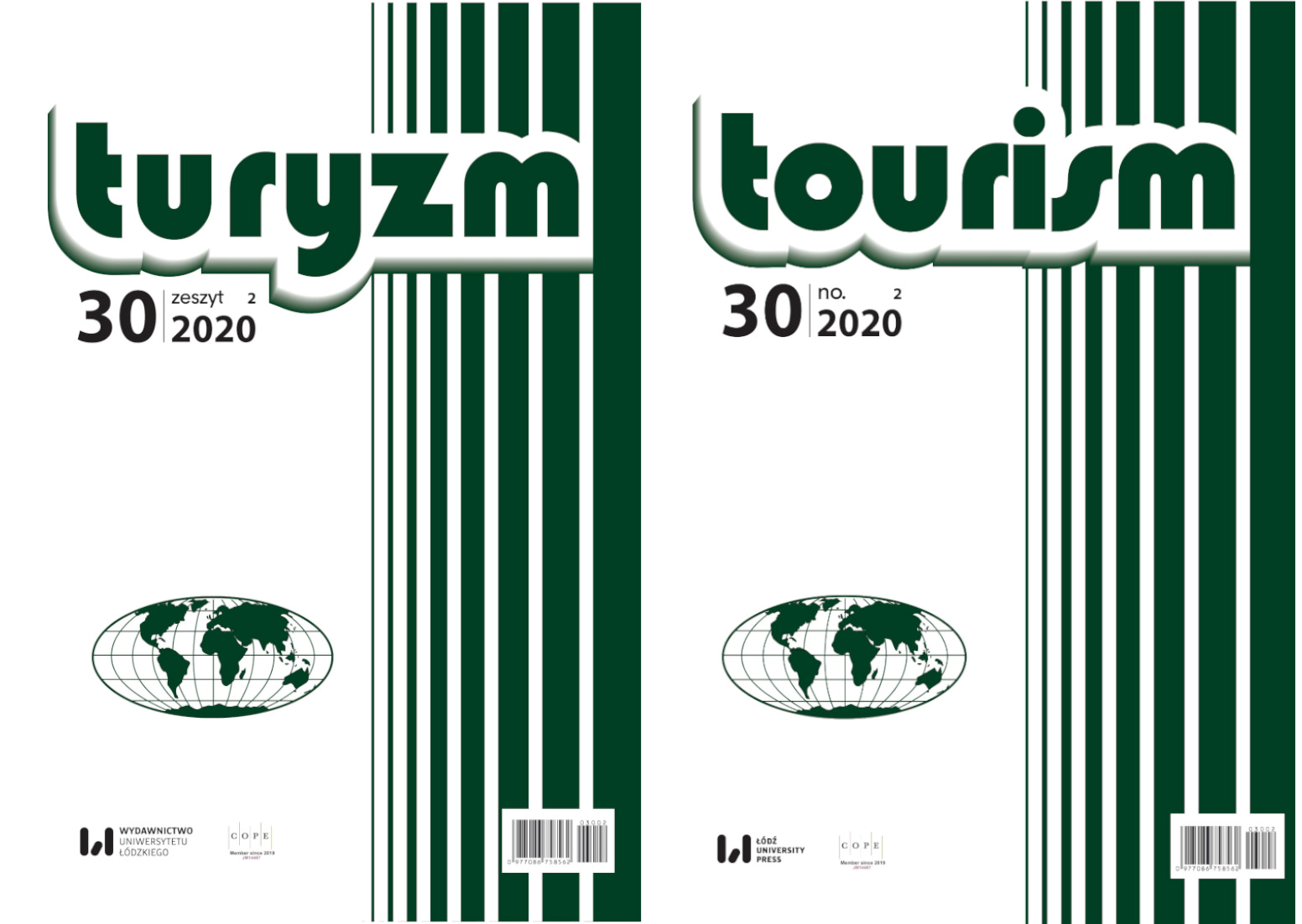Ekologiczne zachowania konsumpcyjne i stosunek do proekologicznych działań w obiektach noclegowych przedstawicieli pokolenia Z
DOI:
https://doi.org/10.18778/0867-5856.30.2.06Keywords:
zrównoważona konsumpcja, pokolenie Z, proekologiczne rozwiązania, turystyka, obiekty noclegoweAbstract
Artykuł ma charakter empiryczny. Jest oparty na wynikach badań ankietowych. Głównym celem opracowania było ukazanie ekologicznych zachowań i wyborów konsumpcyjnych osób należących do pokolenia Z oraz ich stosunku do rozwiązań proekologicznych wdrażanych w ramach polityki ekologicznej przedsiębiorstw turystycznych świadczących usługi noclegowe. Autorzy artykułu próbowali również określić, czy wdrażane rozwiązania mogą zachęcić młodych ludzi do wyboru przyjaznych dla środowiska obiektów świadczących usługi noclegowe i tym samym być źródłem przewagi konkurencyjnej. Opis wyników badań własnych został poprzedzony przeglądem dotychczasowych studiów poświęconych analizowanym zagadnieniom oraz podstaw teoretycznych zrównoważonej konsumpcji. W tym celu wykorzystano metodę badań literaturowych. Analiza wyników pokazuje, że osoby zaliczane do pokolenie Z w większości starają się ograniczać swój negatywny wpływ na środowisko i stosować zasady ekologii w praktyce. Popierają zachowania proekologiczne, stąd na co dzień podejmują działania na rzecz ochrony środowiska, ale przeważnie takie, które dostarczają im korzyści finansowych oraz zdrowotnych. Młodzi deklarują – choć w różnym stopniu – akceptację większości rozwiązań proekologicznych wprowadzanych w bazie noclegowej. Za swoje zaangażowanie w praktykę proekologiczną w obiektach turystycznych oczekują jednak profitów finansowych. Mimo to lepiej oceniają obiekty wdrażające proekologiczne rozwiązania i chętniej by się w nich zatrzymali.
Downloads
References
Anderson, K., Sharp, B. (2010). Do growing brands win younger consumers? International Journal of Market Research, 52 (4), 433-441. DOI: https://doi.org/10.2501/S1470785309201387
Google Scholar
DOI: https://doi.org/10.2501/S1470785309201387
Baker, M.A., Davis, E.A., Weaver, P.A. (2014). Eco-friendly attitudes, barriers to participation, and differences in behavior at green hotels. Cornell Hospitality Quarterly, 55 (1), 89-99. DOI: https://doi.org/10.1177/1938965513504483
Google Scholar
DOI: https://doi.org/10.1177/1938965513504483
Beccera, M., Santalo, J., Silva, R. (2013). Being belter vs. being different: Differentiation competition and pricing strategies in the Spanish hotel industry. Tourism Management, 34, 71-79. DOI: https://doi.org/10.1016/j.tourman.2012.03.014
Google Scholar
DOI: https://doi.org/10.1016/j.tourman.2012.03.014
Berezan, O., Millar, M., Raab, C. (2014). Sustainable hotel practices and guest satisfaction levels. International Journal of Hospitality & Tourism Administration, 15, 1-18. DOI: https://doi.org/10.1080/15256480.2014.872884
Google Scholar
DOI: https://doi.org/10.1080/15256480.2014.872884
Bohdanowicz, P. (2006). Environmental awareness and initiatives in the Swedish and Polish hotel industries – survey results. International Journal of Hospitality Management, 25 (4), 662-668. DOI: https://doi.org/10.1016/j.ijhm.2005.06.006
Google Scholar
DOI: https://doi.org/10.1016/j.ijhm.2005.06.006
Borkowska-Niszczota, M. (2011). Rozwiązania proekologiczne jako sposób podnoszenia konkurencyjności podmiotów świadczących usługi hotelarskie. Prace Naukowe Uniwersytetu Ekonomicznego we Wrocławiu, 157, 41-54.
Google Scholar
Borkowska-Niszczota, M. (2015). Społeczna odpowiedzialność biznesu turystycznego na rzecz zrównoważonego rozwoju na przykładzie obiektów hotelarskich. Economics and Management, 7 (1), 369-392. DOI: https://doi.org/10.12846/j.em.2015.01.23
Google Scholar
Bruska, A. (2016). Zrównoważona konsumpcja. Istota, formy, nabywcy. Logistyka Odzysku, 4 (21), 27-31.
Google Scholar
Buffa, F. (2015). Young tourists and sustainability. Profiles, attitudes, and implications for destination strategies. Sustainability, 7 (10), 14042-14062. DOI: https://doi.org/10.3390/su71014042
Google Scholar
DOI: https://doi.org/10.3390/su71014042
Burzyński, T., Abram, M. (red.) (2011). Ekologia w turystyce jako tendencja rozwoju gospodarki XXI wieku. Kraków: Instytut Turystyki w Krakowie.
Google Scholar
Chan, E.S.W., Hawkins, R. (2010). Attitude towards EMSs in an international hotel: An exploratory case study. International Journal of Hospitality Management, 29 (4), 641-651. DOI: https://doi.org/10.1016/j.ijhm.2009.12.002
Google Scholar
DOI: https://doi.org/10.1016/j.ijhm.2009.12.002
Chen, M.F, Tung, P.J. (2014). Developing an extended Theory of Planned Behavior model to predict consumers’ intention to visit green hotels. International Journal of Hospitality Management, 36, 221-230. DOI: https://doi.org/10.1016/j.ijhm.2013.09.006
Google Scholar
DOI: https://doi.org/10.1016/j.ijhm.2013.09.006
D’Souza, C., Taghian, M. (2005). Green advertising effects on attitude and choice of advertising themes. Asian Pacific Journal of Marketing and Logistics, 17 (3), 51-66. DOI: https://doi.org/10.1108/13555850510672386
Google Scholar
DOI: https://doi.org/10.1108/13555850510672386
Desai, S.P., Lele, V. (2017). Correlating Internet, social networks and workplace – a case of generation Z students. Journal of Commerce & Management Thought, 8 (4), 802-815. DOI: https://doi.org/10.5958/0976-478.X.2017.00050.7
Google Scholar
DOI: https://doi.org/10.5958/0976-478X.2017.00050.7
Edgell, D. (2006). Managing sustainable tourism. A legacy for the future. Nowy Jork: Harworth Hospitality Press.
Google Scholar
Ekogeneracja Z (2020). Pobrane z: https://noizz.pl/eko-generacja-z/xdjgl7t (20.01.2020).
Google Scholar
Erdogan, N., Baris, E. (2007). Environmental protection programs and conservation practices of hotels in Ankara, Turkey. Tourism Management, 28, 604-614. DOI: https://doi.org/10.1016/j.tourman.2006.07.003
Google Scholar
DOI: https://doi.org/10.1016/j.tourman.2006.07.003
Evans, D. (2011). Thrifty, green or frugal: Reflections on susstainable consumption in a changing economic climate. Geoforum, 42 (5), 50-557. DOI: https://doi.org/10.1016/j.geoforum.2011.03.008
Google Scholar
DOI: https://doi.org/10.1016/j.geoforum.2011.03.008
Gao, Y.L., Mattila, A.S. (2014). Improving consumer satisfaction in green hotels: The roles of perceived warmth, perceived competence, and CSR motive. International Journal of Hospitality Management, 42, 20-31. DOI: https://doi.org/10.1016/j.ijhm.2014.06.00
Google Scholar
DOI: https://doi.org/10.1016/j.ijhm.2014.06.003
Ge, H., Chen, S., Chen, Y. (2018). International alliance of green hotels to reach sustainable competitive advantage. Sustainability, 10 (2), 1-15. DOI: https://doi.org/10.3390/su10020573
Google Scholar
DOI: https://doi.org/10.3390/su10020573
Gil, M., Jimenez, J.B., Lorente, J.J. (2001). An analysis of environmental management, organizational context and performance of Spanish hotels. Omega, 29 (6), 457-471. DOI: https://doi.org/10.1016/S0305-0483(01)00033-0
Google Scholar
DOI: https://doi.org/10.1016/S0305-0483(01)00033-0
Haddouche, H., Salomone, Ch. (2018). Generation Z and the tourist experience: Tourist stories and use of social networks. Journal of Tourism Futures, 4 (1), 69-79, DOI: https://doi.org/10.1108/JTF-12-2017-0059
Google Scholar
DOI: https://doi.org/10.1108/JTF-12-2017-0059
Hamed, H.M. (2017). Marketing destinations to millennials: Examining the compatibility between the destination marketing organization website and the millennial tourist prospects. Journal of Tourism and Recreation, 3 (1), 1-20. DOI: http://dx.doi.org/10.12735/jotr.v3n1p01
Google Scholar
DOI: https://doi.org/10.12735/jotr.v3n1p01
Han, H., Hsu, L.-T., Lee, J.-S. (2009). Empirical investigation of the roles of attitudes toward green behaviors, overall image, gender, and age in hotel customers’ eco-friendly decisionmaking process. International Journal of Hospitality Management, 28 (4), 519-528. DOI: https://doi.org/10.1016/j.ijhm.2009.02.004
Google Scholar
DOI: https://doi.org/10.1016/j.ijhm.2009.02.004
Han, H., Hsu, L.-T.,J., Lee, J.-S., Sheu, C. (2011). Are lodging customers ready to go green? An examination of attitudes, demographic, and eco-friendly intentions. International Journal of Hospitality Management, 30 (2), 345-355. DOI: https://doi.org/10.1016/j.ijhm.2010.07.008
Google Scholar
DOI: https://doi.org/10.1016/j.ijhm.2010.07.008
Han, H., Kim, W., Kiatkawsin, K. (2017). Emerging youth tourism: Fostering young travelers’ conservation intentions. Journal of Travel & Tourism Marketing, 34 (7), 905-918. DOI: https://doi.org/10.1080/10548408.2016.1261758
Google Scholar
DOI: https://doi.org/10.1080/10548408.2016.1261758
Han, X., Chan, K. (2013). Perception of green hotels among tourists in Hong Kong: An exploratory study. Services Marketing Quarterly, 34 (4), 339-352. DOI: https://doi.org/10.1080/15332969.2013.827069
Google Scholar
DOI: https://doi.org/10.1080/15332969.2013.827069
Ip, C., Lee, H.A., Law, R. (2012). Profiling the users of travel websites for planning and online experience sharing. Journal of Hospitality & Tourism Research, 36 (3), 418-426. DOI: https://doi.org/10.1177/1096348010388663
Google Scholar
DOI: https://doi.org/10.1177/1096348010388663
Kang, K., Stein, L., Heo, C., Lee, S. (2012), Consumers’ willingness to pay for green initiatives of the hotel industry. International Journal of Hospitality Management, 31 (2), 564-572. DOI: https://doi.org/10.1016/j.ijhm.2011.08.001
Google Scholar
DOI: https://doi.org/10.1016/j.ijhm.2011.08.001
Kapera, I., Wszendybył-Skulska, E. (2017). Działania proekologiczne w ocenie gości hoteli. Turyzm/Tourism, 27 (2), 59-64. DOI: https://doi.org/10.18778/0867-5856.27.2.05
Google Scholar
DOI: https://doi.org/10.18778/0867-5856.27.2.05
Kasim, A. (2004). BESR in the hotel sector: A look at tourists’ propensity towards environment. International Journal of Hospitality and Tourism Administration, 5 (2), 61-83. DOI: https://doi.org/10.1300/J149v05n02_04
Google Scholar
DOI: https://doi.org/10.1300/J149v05n02_04
Kelly, J., Haider, W., Williams, P.W., Englund, K. (2007). Stated preferences of tourists for ecoefficient destination planning options. Tourism Management, 28 (2), 377-390. DOI: https://doi.org/10.1016/j.tourman.2006.04.015
Google Scholar
DOI: https://doi.org/10.1016/j.tourman.2006.04.015
Kostakis, I., Sardianou, E. (2012). Which factors affect the willingness of tourists to pay for renewable energy? Renewable Energy, 38, 169-172. DOI: https://doi.org/10.1016/j.renene.2011.07.022
Google Scholar
DOI: https://doi.org/10.1016/j.renene.2011.07.022
Kryk, B. (2011). Konsumpcja zrównoważona a proekologiczne style życia. Studies & Proceedings of Polish Association for Knowledge Management, 51, 206-218.
Google Scholar
Kwiatek, A., Skiba, M. (2017). Świadomość ekologiczna młodych ludzi, Zeszyty Naukowe Politechniki Częstochowskiej. Zarządzanie, 28 (2), 127-136. DOI: https://doi.org/10.17512/znpcz.2017.4.2.10
Google Scholar
DOI: https://doi.org/10.17512/znpcz.2017.4.2.10
Lazányi, K., Bilan, Y. (2017). Generation Z on the labour market – do they trust others within their workplace. Polish Journal of Management Studies, 16 (1), 78-93. DOI: https://doi.org/10.17512/pjms.2017.16.1.07
Google Scholar
DOI: https://doi.org/10.17512/pjms.2017.16.1.07
Lee, J., Hsu, L., Han, H., Kim, Y. (2010). Understanding how consumers view green hotels: How a hotel’s green image can influence behavioral intentions. Journal of Sustainable Tourism, 18 (7), 901-914. DOI: https://doi.org/10.1080/09669581003777747
Google Scholar
DOI: https://doi.org/10.1080/09669581003777747
Liang, H. (2013). Research on the core competitive power elements evaluation system of green hotel. Journal of Economic Development, Environment and People, 2 (4), 38-47. DOI: https://doi.org/10.26458/jedep.v2i4.38
Google Scholar
DOI: https://doi.org/10.26458/jedep.v2i4.38
Lorek, S., Fuchs, D. (2013). Strong sustainable consumption governance – precondition for a degrowth path? Journal of Cleaner Production, 38, 36-43. DOI: https://doi.org/10.1016/j.jclepro.2011.08.008
Google Scholar
DOI: https://doi.org/10.1016/j.jclepro.2011.08.008
Lorek, S., Spangenberg, J.H. (2014). Sustainable consumption within a sustainable economy – beyond green growth and green economies. Journal of Cleaner Production, 63, 33-44. DOI: https://doi.org/10.1016/j.jclepro.2013.08.045
Google Scholar
DOI: https://doi.org/10.1016/j.jclepro.2013.08.045
Manaktola, K., Jauhari, V. (2007). Exploring consumer attitude and behaviour towards green practices in the lodging industry in India. International Journal of Contemporary Hospitality Management, 19 (5), 364-377. DOI: https://doi.org/10.1108/09596110710757534
Google Scholar
DOI: https://doi.org/10.1108/09596110710757534
Millar, M., Baloglu, S. (2011). Travelers’ most preferred green attributes for a hotel room. Cornell Hospitality Quarterly, 52 (3), 302-311. DOI: https://doi.org/10.1177/1938965511409031
Google Scholar
DOI: https://doi.org/10.1177/1938965511409031
Millar, M., Mayer, K., Baloglu, S., (2012). Importance of green hotel attributes to business and leisure travelers. Journal of Hospitality Marketing and Management, 21 (4), 395-413. DOI: https://doi.org/10.1080/19368623.2012.624294
Google Scholar
DOI: https://doi.org/10.1080/19368623.2012.624294
Mousavi, S.A., Hoşkara, E., Woosnam, K.M. (2017). Developing a model for sustainable hotels in Northern Cyprus. Sustainability, 9 (11), 1-23. DOI: https://doi.org/10.3390/su9112101
Google Scholar
DOI: https://doi.org/10.3390/su9112101
Nemec Rudež, H., Vodeb, K. (2015). Students’ use of social media during the travel process. Tourism and Hospitality Management, 21 (2), 179-190. DOI: https://doi.org/10.20867/thm.21.2.5
Google Scholar
DOI: https://doi.org/10.20867/thm.21.2.5
Nowacki, M., Awedyk, M., Kowalczyk-Anioł, J., Królikowska, K., Pstrocka-Rak, M., Rak, G. (2017). Strategie rozwoju turystyki w Polsce w kontekście zrównoważonego rozwoju. W: Prace Naukowe Uniwersytetu Ekonomicznego we Wrocławiu. Gospodarka turystyczna w regionie. Przedsiębiorstwo. Samorząd. Współpraca. T. 473 (s. 381-389). Wrocław: Wydawnictwo Uniwersytetu Ekonomicznego we Wrocławiu. DOI: https://doi.org/10.15611/pn.2017.473.35
Google Scholar
DOI: https://doi.org/10.15611/pn.2017.473.35
Opris, I., Cenusa, V.-E. (2017). Subject-spotting experimental method for gen Z. TEM Journal, 6 (4), 683-692. DOI: https://doi.org/10.18421/TEM64-06
Google Scholar
Pawłowski, J. (2016). Eco-rating of hotels as a response to consumers’ requirements. Research Papers of Wroclaw University of Economics, 437, 328-337. DOI: https://doi.org/10.15611/pn.2016.437.32
Google Scholar
DOI: https://doi.org/10.15611/pn.2016.437.32
Prochorowicz, M. (2015). Activity of hotel facilities towards the environmental protection. Europa Regionum, 23, 211-222. DOI: https://doi.org/10.18276/er.2015.23-17
Google Scholar
DOI: https://doi.org/10.18276/er.2015.23-17
Przekształcamy nasz świat: Agenda na rzecz zrównoważonego rozwoju 2030 (2020). Rezolucja Zgromadzenia Ogólnego ONZ A/RES/70/1, 25 września 2015. Pobrane z: http://www.gov.pl/web/rpzwoj/agenda-2030 (20.01.2020)
Google Scholar
Richards, G. (2016). The economic impact of youth travel. W: UNWTO, Global report on the power of youth travel. T. 13 (s. 10-13). Madryt: AM Reports, UNWTO.
Google Scholar
Robinot, E., Giannelloni, J.L. (2010). Do hotels’ ”green” attributes contribute to customer satisfaction? Journal of Services Marketing, 24 (2), 157-169. DOI: https://doi.org/10.1108/08876041011031127
Google Scholar
DOI: https://doi.org/10.1108/08876041011031127
da Rosa, F.S., Silva, L.C. (2017). Environmental sustainability in hotels, theoretical and methodological contribution. Brazilian Journal of Tourism Research, 11 (1), 39-60. DOI: https://doi.org/10.7784/rbtur.v11i1.1161
Google Scholar
DOI: https://doi.org/10.7784/rbtur.v11i1.1161
Ryan, V. (2002). Equity management, power sharing and sustainability issues of the ‘new tourism’. Tourism Management, 23 (1), 17-26. DOI: https://doi.org/10.1016/S0261-5177(01)00064-4
Google Scholar
DOI: https://doi.org/10.1016/S0261-5177(01)00064-4
Ryszawska-Grzeszczak, B. (2007). Ekologiczny wymiar konsumpcji żywności. Ekonomia i Środowisko, 1 (31), 150-164.
Google Scholar
Sauthgate, D. (2017). The emergence of generation Z and its impact in advertising. Long-term implications for media planning and creative development. Journal of Advertising Research, 52 (2), 227-235. DOI: https://doi.org/10.2501/JAR-2017-028
Google Scholar
DOI: https://doi.org/10.2501/JAR-2017-028
Sidali, K., Huber, D., Schamel, G. (2017). Long-term sustainable development of tourism in South Tyrol: An analysis of tourists’ perception. Sustainability, 9 (10/1791). DOI: https://doi.org/10.3390/su9101791
Google Scholar
DOI: https://doi.org/10.3390/su9101791
Tzschenke, N., Kirk, D., Lynch, P.A. (2004). Reasons for going green in serviced accommodation establishments. International Journal of Contemporary Hospitality Management, 16 (2), 116-124. DOI: https://doi.org/10.1108/09596110410520007
Google Scholar
DOI: https://doi.org/10.1108/09596110410520007
UNWTO (2017). Sustainable development. Pobrane z: https://www.unwto.org/sustainable-development (20.01.2020).
Google Scholar
Vallone, D., Smith, A., Kenney, T., Greenberg, M., Hair, E., Cantrell, J., Rath, J., Koval, R. (2016). Agents of social change: A model for targeting and engaging generation Z across platforms. How a nonprofit rebuilt an advertising campaign to curb smoking by teens and young adults. Journal of Advertising Research, 56 (4), 414-425. DOI: https://doi.org/10.2501/JAR-2016-046
Google Scholar
DOI: https://doi.org/10.2501/JAR-2016-046
Downloads
Published
How to Cite
Issue
Section
License

This work is licensed under a Creative Commons Attribution-NonCommercial-NoDerivatives 4.0 International License.










